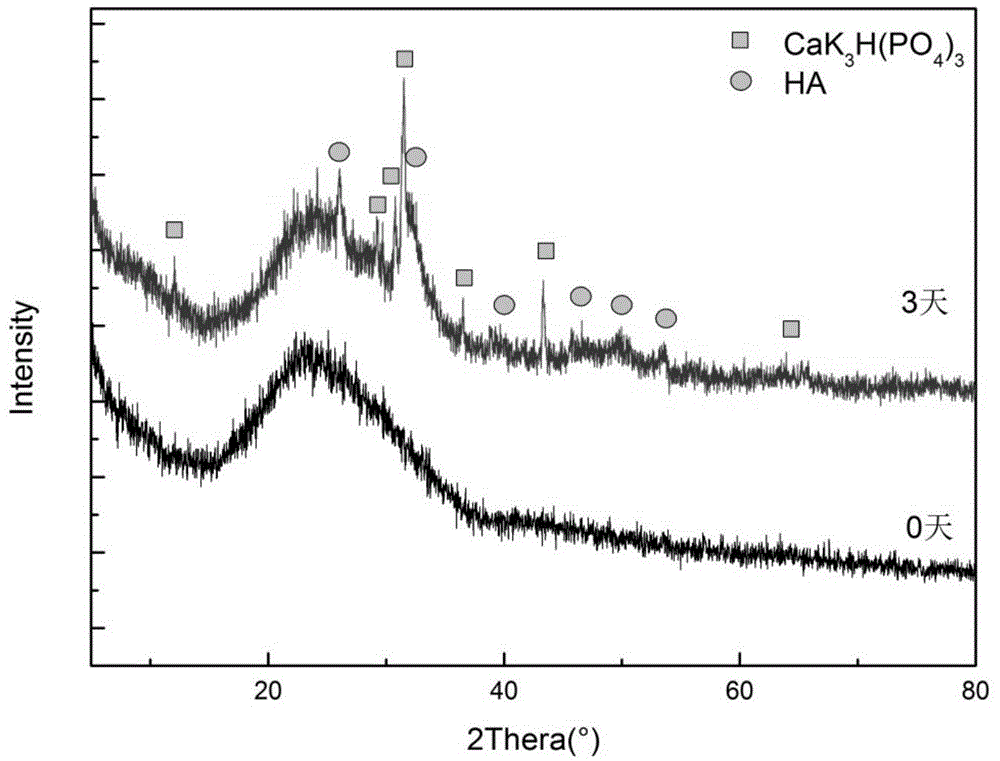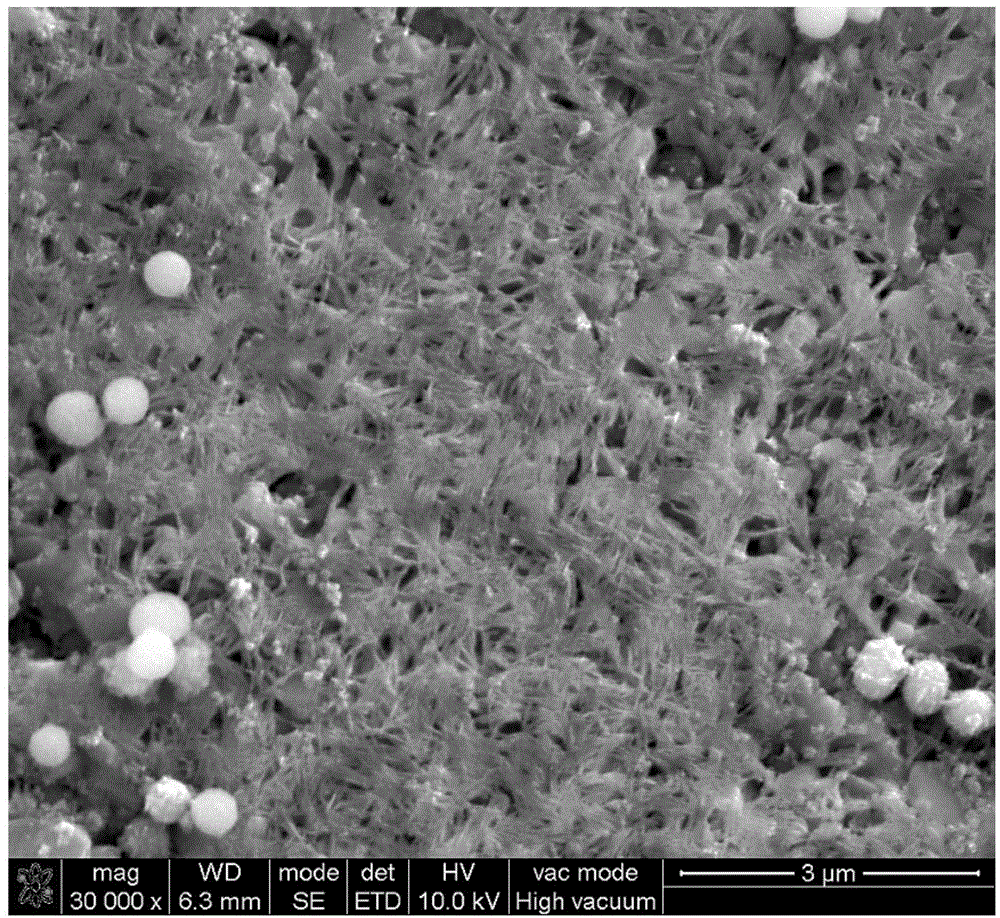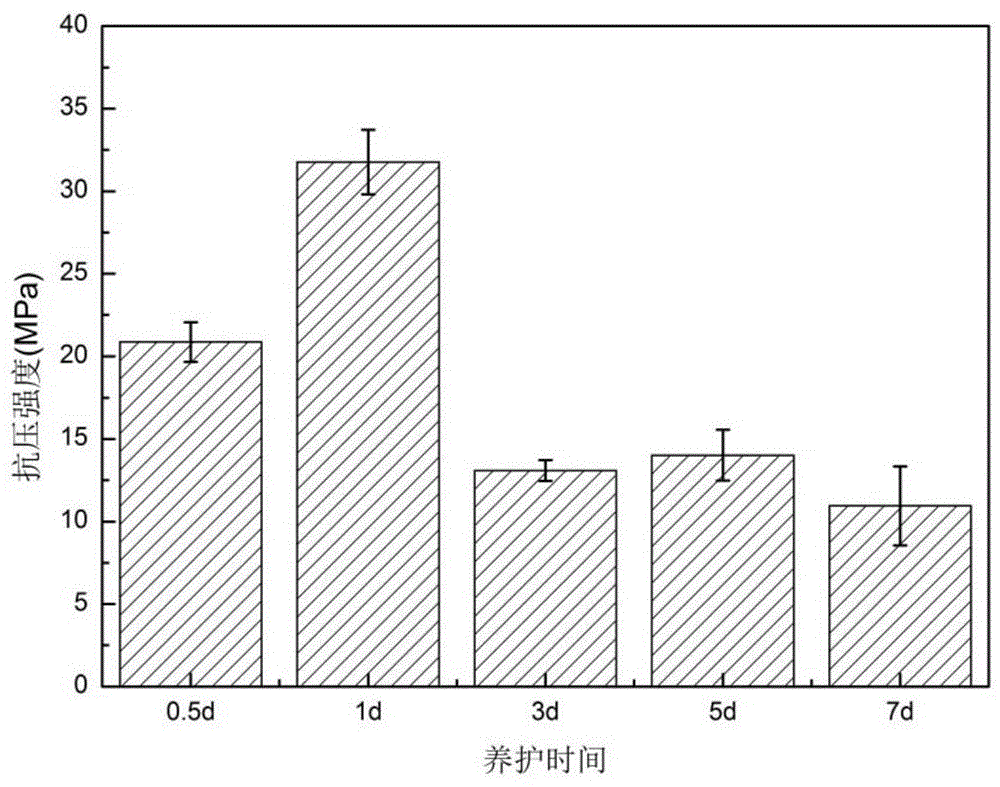Bioglass-sodium alginate composite biomaterial, kit and application
A composite biomaterial and sodium alginate technology, which is applied in the field of curable bioglass-sodium alginate composite biomaterial and its preparation, can solve the problem of long curing time, poor clinical operability of mineral trioxide aggregates, and unsatisfactory antibacterial effect and other issues to achieve the effect of promoted formation, excellent biological activity and biocompatibility
- Summary
- Abstract
- Description
- Claims
- Application Information
AI Technical Summary
Problems solved by technology
Method used
Image
Examples
Embodiment 1
[0032] Step 1: Preparation of bioglass micro-nanospheres
[0033] Using tetraethyl orthosilicate, triethyl phosphate, and calcium nitrate tetrahydrate as raw materials, weigh the corresponding substances in molar ratio, so that the oxides corresponding to each substance in the raw materials are calculated according to the SiO 2 :P 2 o 5 : The molar percentage of CaO was 40:5:55 to prepare bioglass micro-nanospheres. Dissolve 4g of dodecylamine in a mixed solution of 105mL deionized water and absolute ethanol. During the synthesis process, the temperature is controlled at 40°C. After stirring for 10 minutes, 16.00mL of ethyl orthosilicate, 16.32mL of triethyl phosphate, 28.25g Calcium nitrate tetrahydrate, the interval between each feeding is 30min. Stirring was continued for 3 hours after the addition was completed, a white emulsion was obtained, and a wet powder was obtained after centrifugation. The powder is freeze-dried, placed in a box-type electric furnace, and subje...
Embodiment 2
[0039] According to Example 1, ethyl orthosilicate, triethyl phosphate, and calcium nitrate tetrahydrate are used as raw materials, and the corresponding substances are weighed in molar ratios, so that the oxides corresponding to each substance in the raw materials are calculated according to the SiO 2 :P 2 o 5 : The molar percentage of CaO was 37:8:55 to prepare bioglass micro-nanospheres. The specific operation of Step 1 is the same as that of Embodiment 1.
[0040] Step 2: Preparation of Phosphate Buffered Solidification Solution
[0041] Dipotassium hydrogen phosphate and sodium dihydrogen phosphate are added to a certain amount of water in turn to obtain a phosphate buffer solution. The phosphate concentration was 4M and the pH of the solution was 7.
[0042] Step 3: Preparation of bioglass-sodium alginate composite biomaterial:
[0043]The solid powder prepared above was mixed with the solidification solution at 1.60 g / mL to form a paste. Fill the reconciled paste ...
Embodiment 3
[0045] According to Example 1, ethyl orthosilicate, triethyl phosphate, and calcium nitrate tetrahydrate are used as raw materials, and the corresponding substances are weighed in molar ratio, so that the oxides corresponding to each substance in the raw materials are calculated according to the SiO 2 :P 2 o 5 : The molar percentage of CaO was 37:8:55 to prepare bioglass micro-nanospheres. The specific operation of Step 1 is the same as that of Embodiment 1.
[0046] Step 2: Preparation of Sodium Alginate Phosphate Buffer Solidification Solution
[0047] Weigh sodium alginate and dissolve it in deionized water to prepare sodium alginate solution. Dipotassium hydrogen phosphate and sodium dihydrogen phosphate were sequentially added to the sodium alginate solution to obtain a 0.5% alginic acid phosphate buffer solution with a phosphate concentration of 4M.
[0048] Step 3: Preparation of bioglass-sodium alginate composite biomaterial:
[0049] The solid powder prepared abo...
PUM
 Login to View More
Login to View More Abstract
Description
Claims
Application Information
 Login to View More
Login to View More - R&D
- Intellectual Property
- Life Sciences
- Materials
- Tech Scout
- Unparalleled Data Quality
- Higher Quality Content
- 60% Fewer Hallucinations
Browse by: Latest US Patents, China's latest patents, Technical Efficacy Thesaurus, Application Domain, Technology Topic, Popular Technical Reports.
© 2025 PatSnap. All rights reserved.Legal|Privacy policy|Modern Slavery Act Transparency Statement|Sitemap|About US| Contact US: help@patsnap.com



